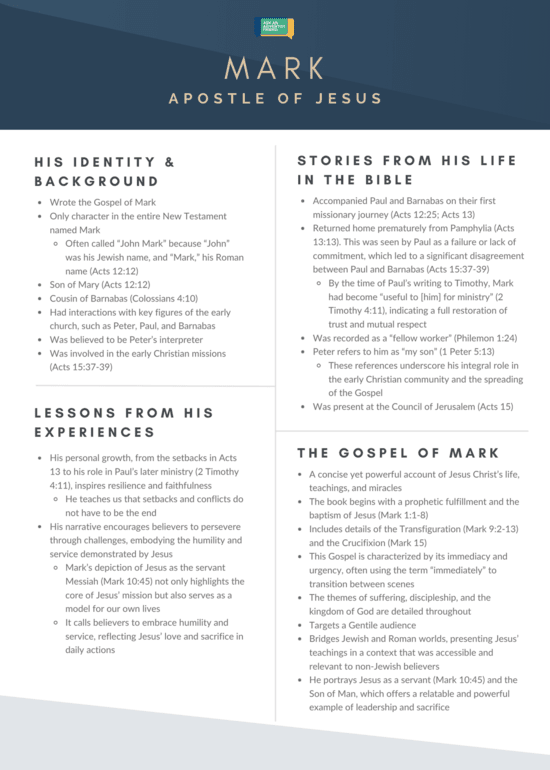Getting to Know Mark—Gospel Writer and Follower of Jesus
Mark (whose full name was John Mark) had a lot of roles in the New Testament: he was an early follower of Jesus Christ, he traveled the Mediterranean as a Christian missionary, and he wrote a book of the Bible.
The thing is, aside from a few mentions in the New Testament, we don’t actually know much about Mark. Who was he really?
While it takes some piecing together from different books of the Bible and other historical sources, here we’ll share the known details of this man who led an active life in spreading the Christian faith. We’ll talk about:
- What the Bible says about Mark’s background
- Mark’s life as a Christian
- What books Mark wrote
- Lessons we can take from Mark’s life and writings
First, let’s get a snapshot of who exactly this person John Mark was.
What the Bible says about Mark’s background

Photo by Pixabay
Mark had a role in the missionary effort of the early Christian church, although he is many times eclipsed by others with more prominent mentions in Scripture.
But the Bible does tell us that Mark and his mother Mary were early participants in Christianity. It was at their house that Peter stayed after he was miraculously released from prison (Acts 12:12). And because many Christians were gathered at their house praying, it is likely that his family was somewhat wealthy to be able to host so many people at once.
We can also conclude from Scripture that Mark was a cousin of Barnabas, who traveled with the apostle Paul (Colossians 4:10).
Mark accompanied Paul and Barnabas in some of their missionary travels, and he worked in and around the Mediterranean region. He also had a close relationship to Peter, who considered Mark as an apprentice or protegé of his (1 Peter 5:13). And Mark mentions Peter’s name in his Gospel account more than any other name.
In fact, early church leader Papias said that Mark’s account of the Gospel is actually a record of what Peter told him,1 and many sources refer to Mark as a disciple2 of Peter.
Aside from this, we don’t have many other biographical details about Mark. But this is typical of the Bible. Many people featured in Scripture, including well-known figures like Paul or Peter, are given no more than the barest of biographical sketches, and these details are often scattered throughout books. The Bible writers focused more on the significant things these people did.
But let’s spend a minute on Mark’s name. Acts 12:12 addresses him as “John whose surname was Mark” (NKJV). Other versions say “John who was called Mark” (CSB) or “John whose other name was Mark” (ESV).
Due to the mix of culture in first century Judea, John is his Hebrew name, while Mark is his Roman name.3 He is more often referred to as Mark, perhaps to distinguish him from John the disciple.
Now that we have a bit of background information, let’s move on to what Mark did as a follower of Jesus.
Mark’s life as a Christian
Officially, the first time the Bible talks about Mark is when Peter goes to his mother’s house after escaping prison (Acts 12:12). But many Bible scholars believe he is mentioned anonymously before this, ironically, in the Gospel of Mark.
When Judas Iscariot leads the authorities, accompanied by a mob, to Jesus in the Garden of Gethsemane, chaos erupts. In the heat of the moment, Peter cuts off a man’s ear with his sword.4 Eventually, all of Jesus’ disciples flee the scene to escape capture.
Then Mark inserts a couple lines in his Gospel account that appear in no other:
“Now a certain young man followed Him [Jesus], having a linen cloth thrown around his naked body. And the young men laid hold of him, and he left the linen cloth and fled from them naked” (Mark 14:51-52, NKJV).
If this was indeed himself that Mark was describing, it makes sense why he’d be ashamed to identify himself here. Not the most flattering image! Not only was he joining the disciples in failing to stand by their Master and Teacher, but in his haste to flee, he lost the only garment covering him! Yet, he still felt that this should be included in his account of Jesus’ life and ministry.
Of course, this isn’t conclusive proof that Mark is indeed referring to himself here. But given that he was compelled to include this information, many scholars note the reasonable possibility here. Why bother, otherwise?
The Seventh-day Adventist Bible Commentary also points out that Mark hides his identity in the same way the disciple John attempts (and fails) to conceal his identity in his account of the Gospel.5
One Adventist pastor and author offers this perspective:
“The writer of the Gospel of Mark is normally generous with details. However, in this case, he mysteriously deletes the name of the fleeing youth. Many scholars have suggested that this embarrassed young man was Mark himself and he includes the account in the record to satisfy his own conscience. Other Gospel writers are evidently ignorant of the episode. … It was not uncommon in that day for people to rise at night and go on errands wearing nothing more than the coverings from their beds.”6
But assuming Mark may have fled in disgrace at the Gethsemane encounter, at least we know he didn’t completely flee from being a follower of Christ. Eventually, he became a missionary.
Mark the missionary
We see Mark’s ministry begin to blossom in the book of Acts. Acts 12:25 records,
“And Barnabas and Saul returned from Jerusalem when they had fulfilled their ministry, and they also took with them John whose surname was Mark” (NKJV).
Perhaps his interest in Jesus and his relationship to Barnabas helped secure him a spot in the first missionary journey.
Likely between AD 46 and AD 48, Paul and his missionaries sailed from Paphos, on the coast of Cyprus, and stopped at Perga, which is in present-day south Turkey.
But then the Bible says,
“Now when Paul and his party set sail from Paphos, they came to Perga in Pamphylia; and John [Mark], departing from them, returned to Jerusalem” (Acts 13:13, NKJV).
Why did Mark leave the missionaries so soon and return home? The Bible is silent on this point. Perhaps young Mark didn’t realize how difficult the work would be, and he got discouraged. Perhaps he was homesick.
Whatever the cause, it was a big enough deal that at the start of the next missionary journey, Paul and Barnabas quarreled about it.
“Now Barnabas was determined to take with them John called Mark. But Paul insisted that they should not take with them the one who had departed from them in Pamphylia, and had not gone with them to the work. Then the contention became so sharp that they parted from one another. And so Barnabas took Mark and sailed to Cyprus; but Paul chose Silas and departed” (Acts 15:37-40, NKJV).
Obviously, Paul did not want to give Mark a second chance. But Barnabas still had hope.
And even though these ministry partners had this sharp disagreement, good came out of it. Instead of two missionaries going out to spread the Gospel, four missionaries went to two different places, which covered more ground.
And Mark must have proved himself able here and after, because the Bible records no more instances of Mark quitting and going home or disappointing his companions. It’s likely he was part of many subsequent missionary efforts.
Even Paul came around eventually. In his epistle (letter) to Philemon, Paul calls Mark his “fellow laborer” (Philemon 1:23-24, NKJV).
And in 2 Timothy, Paul writes, “Get Mark and bring him with you, for he is useful to me for ministry” (2 Timothy 4:11, NKJV).
We can only speculate what held Mark back before, but what matters is that he didn’t let that be the end of his efforts to be used by God. He still ended up being a devoted missionary for Jesus. And in doing so, he redeemed himself and became so committed that Paul requested his company later on.
Mark’s writing

Photo by John-Mark Smith
It is widely believed that Mark was the author of the Gospel According to Mark. Clues within the text point to him, and the early church generally agreed Mark was the author. For example, Papias of Hierapolis, an early church leader, said:
“Mark having become the interpreter of Peter, wrote down accurately whatsoever he remembered. It was not, however, in exact order that he related the sayings or deeds of Christ. For he neither heard the Lord nor accompanied Him. But afterwards, as I said, he accompanied Peter, who accommodated his instructions to the necessities [of his hearers], but with no intention of giving a regular narrative of the Lord’s sayings. Wherefore Mark made no mistake in thus writing some things as he remembered them. For of one thing he took especial care, not to omit anything he had heard, and not to put anything fictitious into the statements.”7
The historian Eusebius and the theologian Irenaeus also affirmed his authorship,8 with Irenaeus also referring to Mark as “the disciple and interpreter of Peter.”9
His is also thought to be the first Gospel account written, composed in the decades before Jerusalem was destroyed in 70 AD.10
However, while Mark was the one who wrote this Gospel account, it’s widely believed that he got the majority of his content from Peter.11 Perhaps this is why his Gospel reflects a lot of oratory patterns, such as beginning sentences with “and” (Mark 2:1, 2, 4, 6, 14, 16, 19, 22, 24, and 27, for example).
One thing to note before we get further into Mark’s account of the Gospel. The very last verses of his book, Mark 16:9-20, are believed by many scholars to have been included later, well after Mark was considered finished with his account.
Some suggest that Mark left off at verse 8 to make an “open ending” to his Gospel, with most early Christians being aware of the immediate details of the life of Jesus and His resurrection. Or perhaps he wanted the reader to insert themselves in the Christian story, to take the declaration of an empty tomb as a thought-provoking way to keep readers thinking about Jesus and what He’s doing as the risen Son of God.12
While we don’t know for sure what could have been added when, what we do know is that these verses are biblically sound. Most of them are taken from other Gospels or state information that can be found elsewhere in the Bible.13
Let’s look at some of the key elements of this synoptic Gospel to get a clearer understanding of its purpose.
A unique style
Mark’s Gospel is concise and packed with action scenes. He uses the word euthos (or “immediately”) 41 times throughout the book, signifying urgency and action.14 He does not write elaborate descriptions or long genealogies, and he doesn’t quote the Old Testament as much as other Gospel writers. He doesn’t even focus on Jesus’ parables, and the famous Sermon on the Mount is missing in Mark. He’s focused on the events that made up Jesus’ ministry.
Like a movie, Mark’s Gospel cuts from one scene to the next, without much detail in between. Even his stories lack some typical contextual information that other books tend to include. He doesn’t list many locations for the events he covers, preferring to transition from one occurrence to another with phrases like “and again” or “then.”
Because Mark is shorter than any other Gospel, his has often been called the summarizing Gospel or the abbreviated Gospel.15
This is because Mark’s Gospel is tailored to a Roman audience. He may have even lived in Rome when he wrote his Gospel.16 The Romans valued action and authority and would have identified with the focused scenes and authoritative stories.17 Also, the Roman Gentiles were possibly being persecuted at this time. Because no one knew what would happen from day to day, Mark’s account of the Gospel came just at the right time to help spread the good news of Jesus.18
And because the Romans were not familiar with Jewish customs and history, describing things like Jesus’ genealogy (as Matthew and Luke do) or focusing a lot on Jewish prophecies about Him wouldn’t have mattered much to them.
Instead, Mark had different themes in mind: Jesus’ purpose, His ministry, His suffering and death, and what the kingdom of God really is.
Themes of Mark’s account of the Gospel

Photo by Rodolfo Clix on Pexels
The book of Mark is centered on Jesus, particularly what His purpose was on earth, and how He suffered.
It begins with John the Baptist preparing the way for Jesus, baptizing and predicting one “mightier than [he]” coming (Mark 1:7, NKJV). John declares that Jesus will baptize the people with the Holy Spirit.
Jesus’ critical statement reveals His purpose soon after:
“The time is fulfilled, and the kingdom of God is at hand. Repent, and believe in the Gospel” (Mark 1:15, NKJV).
This sets the tone for Jesus’ identity throughout the Gospel: one who has a greater power and who saves through repentance.
This purpose shows itself as Jesus travels and ministers to the people in and around Jerusalem. And after His resurrection, He instructs the disciples to continue after this manner.
“Go into all the world and preach the Gospel to every creature” (Mark 16:15, NKJV).
Jesus’ mission was and is to bring the whole world to Him so they can live forever with Him someday. Mark capitalizes on this and makes it a prominent message throughout his Gospel.
Mark also highlights the kingdom of God. In a conversation with a scribe, Jesus lists the greatest commandments, loving God and loving your fellow humans.
The scribe correctly observes that these two commandments are greater than animal sacrifice, a ceremony the Israelite nation had conducted for centuries for forgiveness of sins.
The scribe had hit the nail on the head. Jesus replied, “You are not far from the kingdom of God” (Mark 12:34, NKJV).
Jesus was the ultimate sacrifice. All those ceremonial animal sacrifices the Israelites had been doing were a physical practice to help them understand the big picture: Jesus, in His perfect love and innocence, is the one who forgives our sins.
But to do that, He had to endure suffering and death, the other big theme of Mark’s version of the Gospel. Mark wanted his readers to know about Jesus’ impending crucifixion right away, and it may have been a way of revealing His purpose as the servant king. He may have also been speaking to the Roman values of action.
In just chapter three of his Gospel account, Mark describes the plot to kill Jesus. This is mentioned far earlier than any of the other Gospels (Matthew 12:14, Luke 19:47, John 11:53).
Mark includes a story that highlights this theme. In Mark 8, Jesus tells the disciples that He must suffer. Then He tells everyone gathered,
“Whoever desires to come after Me, let him deny himself, and take up his cross, and follow Me. For whoever desires to save his life will lose it, but whoever loses his life for My sake and the Gospel’s will save it” (Mark 8:34-35, NKJV).
This echoes what Jesus would go through to save us. He took up His Cross and lost His life to purchase our lives.
Jesus Himself stated His role as the servant:
“For even the Son of Man did not come to be served, but to serve, and to give His life a ransom for many” (Mark 10:45, NKJV).
His suffering and horrible death were all part of His role as the servant.
Having given an in-depth look at the book of Mark and the person who wrote it, let’s look at some of the things we can glean from his life for our own.
Lessons Mark leaves us
Although not a prominent figure in the New Testament, Mark was nonetheless instrumental in spreading the Gospel and supporting the early Christian church. Here are a few things we can learn from his life:
Resilience and perseverance

Photo by Renzo D’souza on Unsplash
Mark had a lot of personal growth throughout his life. As a younger man, he faced challenges while heading out on a missionary journey with Paul and Barnabas, causing him to essentially give up and go home (Acts 13:13).
But it didn’t stop him from living for Christ. Eventually, he went on to accomplish much in the effort of spreading Christianity. We aren’t told exactly what he did, but he was successful to the point that Paul truthfully called him “useful,” a high compliment to come from him (2 Timothy 4:11).
When we are tempted to give up or set aside our efforts to share the Gospel because we are discouraged or disappointed, we can remember Mark. He persevered, even when he faced challenges or discouragement. He was resilient enough to give things another try later on.
We can follow his lead and know that even if we have our ups and downs, we can’t give up on God. We can remember the things He has done for us, and persevere in our relationships, still seeking to share our good news with others. God will help us, as He helped Mark.
Jesus, the servant
Mark emphasizes Jesus’ role as the servant leader throughout his Gospel. As we saw above, Mark alludes to the crucifixion early on in order to show that Jesus was taking the lead to save us by dying a criminal’s death.
Mark’s book shows us Jesus’ heart for meeting the needs of those He came to save, and doing it with humility instead of pride or condescension. This can inspire us to do the same in our own corners of the world. We can cheerfully offer to help others in need and take every opportunity to reflect the character of Christ in anything we do.
Be active
Continuing on the theme of servant leadership, we can see through the book of Mark that Jesus’ servant leadership is more than just having sympathy or offering encouraging words. With the primary focus on the events of Jesus’ ministry and the actions He demonstrated, we can remember that our actions can also proclaim the Gospel even more powerfully than only words.
Mark’s concise, action-oriented approach also shows us that we don’t have to tell every word of every story to get the point across that best fits the needs of the present moment or situation. It’s a good idea to try to understand what would best resonate with those around us.
A far-reaching legacy
While Mark was just a young man when Jesus ministered on earth, he made it his priority to learn, understand, and record what Jesus said and did. And he worked to further the ministries of his companions and mentors, such as Peter, Paul, Barnabas, and more. This undoubtedly
He persevered despite struggles and came out successful, bearing a legacy of a unique account, both stylistically and thematically, of Jesus and His time on earth. He wrote for Gentiles in a way they would understand and appreciate, so that they, too, might accept Jesus as their Savior.
Ready to learn about other significant people in the New Testament?
- Wallace, J. Warner. “Mark’s Relationship With Peter Was The Foundation For His Gospel,” Cold Case Christianity, August 22, 2018. [↵]
- “Gospel According to Mark,” Britannica, July 2, 2024. [↵]
- “Saint Mark,” Britannica, June 12, 2024. [↵]
- This event is also described in more detail in John chapter 18. [↵]
- The Seventh-day Adventist Bible Commentary, notes to Mark 14:51. [↵]
- Bynum, J. E., MDiv, “Intern Troubles,” Ministry Magazine, August 1963. [↵]
- Papias, “Fragments of Papias,” The Apostolic Fathers with Justin Martyr and Irenaeus, ed. Alexander Roberts, James Donaldson, and A. Cleveland Coxe, vol. 1, The Ante-Nicene Fathers (Buffalo, NY: Christian Literature Company, 1885), pp. 154-155. [↵]
- “Who Wrote the Gospel of Mark?” Zondervan Academic, September 22, 2021. [↵]
- Ireneaus, Haer. 3.1.1; translation from Black, Mark, 99-100. [↵]
- “Gospel According to Mark” [↵]
- “Who Wrote the Gospel of Mark?” [↵]
- Vroom, Erin, MA. “The ‘Missing End of Mark’s Gospel,” The Bible Project, October 1, 2019. [↵]
- Ibid. [↵]
- Strauss, Mark L, PhD. “Mark: The Gospel of the Servant-Messiah,” The Bible Project, September 17, 2017. [↵]
- “Who Wrote the Gospel of Mark?” [↵]
- “Book of Mark,” Bible Study Tools. [↵]
- “Early Roman Society, Religion, and Values,” Claremont Colleges Library. [↵]
- “Book of Mark.” [↵]
Questions about Adventists? Ask here!
Find answers to your questions about Seventh-day Adventists
More Answers
Why Many Seventh-day Adventists Choose a Vegetarian Diet
Why Many Seventh-day Adventists Choose a Vegetarian Diet?You may have an Adventist friend who is vegetarian, or maybe you’re attending a Seventh-day Adventist Church for the first time and notice the potluck doesn’t have any meat. This isn’t unusual in Adventism. In...
The Health Benefits of Fresh Air You Should Know About
The Health Benefits of Fresh Air You Should Know About“When you can’t breathe, nothing else matters,” the American Lung Association tells us. And while that’s true, the kind of air you’re breathing will determine the health benefits you experience. Breathing fresh...
What Do Seventh-day Adventists Choose to Eat?
What Do Seventh-day Adventists Choose to Eat?Food blogs overwhelm the internet; food fads are all the rage; and copycat and healthy versions of food are the subject of many a get-together. Eating—and eating the best way—is a big deal. And everybody has a different...
10 Incredible Ways Sunlight Can Improve Your Health
10 Incredible Ways Sunlight Can Improve Your HealthAre you concerned about sunlight’s negative effects? You might be the one who lathers on the sunscreen and covers up when you go outside. Or maybe you avoid being outside as much as possible. You might be surprised,...
Why Is Water So Important?
Why Is Water So Important?We all know that water is a substance we can’t live without. It quenches our thirst and keeps us hydrated on the inside. And it’s necessary for hygiene and cleansing on the outside too. But did you know that the cleansing properties of water...
Ellen White’s Writings and the Adventist Health Message
Seventh-day Adventists are known for their emphasis on healthy living. And Ellen G. White was a significant influence in the development of this priority and practice among Adventists.
Health Clinics
Ellen White and Adventist Healthcare—Ahead of Their Time Medical care in the mid-1800s was primitive, to say the least. Basic concepts we take for granted—such as proper handwashing or recognizing the dangers of bloodletting—were nonexistent. And doctors often had...
What Did Ellen White Teach about Vegetarianism?
What Did Ellen White Teach about Vegetarianism?One thing you might have heard about Seventh-day Adventists is their emphasis on a vegetarian lifestyle. If you’re wondering why that is, it goes back to our church’s humble beginnings: As Adventists studied the Bible,...
How Ellen White’s Teachings Can Improve Your Health
How Ellen White’s Teachings Can Improve Your Health Healthcare in the nineteenth century was said to leave “more disease than it took away” with its use of bloodletting and “medicines” like mercury and arsenic.1 As people questioned these methods, new approaches...
Change Your Perspective on Life with These 5 Mindsets
5 Biblical Mindsets to Change Your Life for the Better Sometimes, life is just plain hard. There’s no way around it. So would thinking about things differently really change anything? Our perspective on life, and everything it throws at us, affects more than we’re...
Bible Promises for When You’re Worried or Fearful
Bible Promises for When You’re Worried or Fearful The Bible is full of beautiful promises that can comfort us in a variety of situations. They can give us hope when we are hopeless, make us feel grateful for God’s love, and comfort us when we’re grieving or suffering....
12 Practical Ways to Overcome Worry
12 Practical Ways to Overcome Worry DISCLAIMER: This content is for informational purposes only. It does not constitute any professional medical advice and is not intended as a substitute for professional mental health therapy. It’s easy to get stuck in a cycle of...
How the Bible Talks About Worry, Fear, and Anxiety
How the Bible Talks About Worry, Fear, and Anxiety Worry and fear are the ingredients of anxiety. It’s easy to see how the world isn’t perfect—and the anticipation of a bad event or experience (that may or may not even happen) can end up draining the peace and...
How to Calm Anxious Thoughts, Using the Bible
How to Calm Anxious Thoughts, Using the Bible You were expecting a phone call from your daughter half an hour ago, and she still hasn’t called. She’s also not answering your calls. You feel your heart thumping as your thoughts race: What if she’s been in a car...
What You Should Know About the Adventist Health Studies
What You Should Know About the Adventist Health StudiesYou may have heard that Seventh-day Adventists care about health. But what you may not know is that Adventists have been the subjects of long-term research into lifestyle and health. Since 1958, researchers from...
Benefits of Sunlight
Yes, There Are Health Benefits of SunlightDespite the bad reputation it’s gotten, sunlight is generally associated with positivity, as shown by songs like “You Are My Sunshine,” or phrases that refer to delightful people as having a “sunny disposition.” There’s a...
Why Your Body Needs Rest for Optimal Health
Why Your Body Needs Rest for Optimal HealthStruggling to think straight? Wondering why you can’t remember that important tidbit you heard earlier today? Feeling like your emotions are about to explode? These are just some of the symptoms that can reveal your need for...
The Seventh-day Adventist Diet: One of Our Key Longevity Secrets
The Seventh-day Adventist Diet: One of Our Key Longevity SecretsOats, avocados, lentils, tofu—probably not what you first think of in a standard American diet. But if you show up at the home of an Adventist, chances are you may be served one of these staples. Out of a...
Why You Need Fresh Air
Why You Need Fresh Air“When you can’t breathe, nothing else matters,” the American Lung Association tells us. We couldn’t agree more! Breathing in clean air is an essential part of caring for our bodies, which God has given us. Together with other health principles,...
Sabbath Meal
Everything You Need to Know About Sabbath MealsFor Seventh-day Adventists, sharing a Sabbath meal with friends and family is one of the most special and memorable parts of the Sabbath. That’s why we want to share with you all about Sabbath meals and why they’re such a...
Adventists and Healthy Living
Adventists and Healthy LivingWhat’s the Adventist “Health Message” All About? One thing Seventh-day Adventists are known for is their emphasis on living healthy lives. Since our bodies are living temples of the Holy Spirit (1 Corinthians 6:19, 20), we strive to stay...
Water’s Importance—Physical Benefits and Spiritual Applications
Water’s Importance—Physical Benefits and Spiritual Applications We all know that water is a substance we can’t live without. Not only does it quench our thirst and keep us hydrated from the inside, but it’s necessary for hygiene and cleansing on the outside as well....
How Important is a “Day of Rest?”
How Important is a “Day of Rest?” Why God Created a Day for Downtime by Martin Casper Do you ever experience the feeling of complete overload? Do you feel like the only way you can get ahead is by slamming it 24/7? I hear these types of comments more and more...
7 Reasons Why a Day of Rest is Important
7 Reasons Why a Day of Rest is ImportantWe live in a fast-paced world. It seems as if success is measured in how much you can do in a short amount of time. (Extra points for the service or product that is available 24/7). The idea that we will be more successful if we...
How do Adventists choose what to eat?
How do Adventists choose what to eat?Every day, parents go through the ritual of getting their kids to eat what is healthy and good while trying to steer them away from what can hinder the growth of their developing bodies. Nutritionists work with their clients to...
How Can I Have a Better Marriage?
Is it possible to have a happy marriage?
Why are many Adventists Vegetarian?
Why are many Adventists Vegetarian?The diet intended for man is outlined in Genesis 1:29, “And God said, ‘See, I have given you every herb that yields seed which is on the face of all the earth, and every tree whose fruit yields seed; to you it shall be for food.’”...
Didn’t find your answer? Ask us!
We understand your concern of having questions but not knowing who to ask—we’ve felt it ourselves. When you’re ready to learn more about Adventists, send us a question! We know a thing or two about Adventists.





















